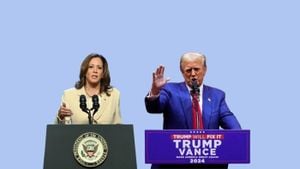The Bank of Korea has made the significant decision to lower its base interest rate by 0.25 percentage points on February 25, 2025, marking the rate change from 3.00% to 2.75%. This move, widely anticipated by market analysts, highlights the urgency of addressing the rapidly deteriorated economic conditions facing South Korea amid domestic political instability and external economic pressures.
Governor Lee Chang-yong explained the rationale behind the decrease, saying, "The decrease in the base rate is to alleviate the burden on households and stimulate private consumption and investments." This shift aims to alleviate pressure on the economy as it grapples with challenges both at home and abroad.
Previously, the monetary policy committee had cut the base rate twice consecutively last year, providing evidence of its shift toward easing policies during periods of economic slowdown. The recent economic data prompted another rate cut as many analysts pointed to the pressing need to support consumption and investments.
With the latest rate cut, the Bank of Korea has now reduced rates by 0.75 percentage points since October last year, and economic growth forecasts have also taken a hit, falling from 1.9% to 1.5%. Analysts have attributed this adjustment to various factors, including rising household debt and uncertainty surrounding U.S. trade policy under President Donald Trump.
Lee noted the growing concerns over exchange rate stability, especially with respect to the U.S. dollar. He added, "There are concerns about the risks of the exchange rate due to the widening gap with U.S. rates." These fluctuations can have significant repercussions on South Korean industries, particularly those reliant on exports.
Looking back on the recent political climate, the imposition of martial law and subsequent socio-political disturbances have had palpable effects on consumer confidence and investment levels. The economy has struggled against these backdrops, culminating in calls for aggressive monetary measures to revive growth.
Economists had projected the rate cut as necessary to ease pressures on consumer spending and mitigate risks to the financial system. It is estimated the cut could relieve the household interest burden by over 9 trillion KRW (approximately 8 billion USD) annually if lending rates follow suit.
Despite these changes, financial experts advised caution. The broader impacts of international trade policies, particularly those initiated under Trump's administration, also loom large, contributing to downturns when inflation risks through tariffs threaten to increase input costs for local businesses.
Trade tensions have aggravated the existing vulnerabilities of the South Korean economy, leading to heightened vigilance among consumers and investors. Governor Lee has advocated for additional fiscal measures to complement the monetary policy adjustments, noting, "A supplementary budget of 15 to 20 trillion KRW is urgently needed to bolster growth."
While the Bank of Korea attempts to stimulate demand through lower interest rates, the central bank remains wary of keeping inflation rates stable. The delicate balance between stimulating the economy and avoiding runaway inflation is key to maintaining economic stability.
With these monetary changes, market observers will be watching closely for developments in both domestic consumption trends and external pressures from the global economy. Lee highlighted the bank's commitment to continuously monitoring the effects of its policies on growth, inflation, and financial stability.
Overall, this latest rate cut is indicative of the Bank of Korea's response to the prevailing economic climate, demonstrating the institution's flexibility and commitment to addressing multifaceted economic challenges as they emerge.



